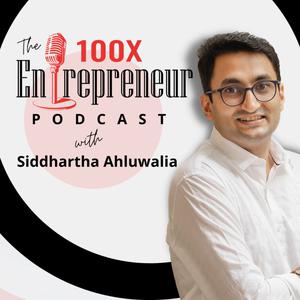
SEED TO SCALE Podcast Series by Accel
SEED TO SCALE Podcast Series
Click on get notified button above!! Hear it from the change-makers themselves! Our podcasts cover a wide range of topics that will leave you hooked, and wanting more! This includes tech, markets, startups, and stories which helps you to learn how to go about building your startup. We feature Industry Experts, Founders, VC's, Authors and Leaders of various sectors. This podcast is hosted by Anand Daniel, a partner at Accel India. Click on get notified button above to get all updates of Accel directly to your Mail & Whatsapp. Be the first to know from SEED TO SCALE Podcast Series by Accel
- 40 minutes 32 secondsLessons on Product, Pricing, and Trust: Insights from ServiceNow | Decoding AIGenAI is growing rapidly, evolving from a mere tool into an intelligent partner that empowers businesses to scale with greater speed and efficiency. In Episode 2 of our Decoding AI series, Vishwesh Pai, Senior Director of Product Management for AI Platform at ServiceNow, and Anagh Prasad, Investor at Accel dive into how large companies are navigating the opportunities in enterprise software, especially with the rise of generative AI. Vishwesh reflects on his journey from leading AI initiatives at Amazon Alexa to spearheading AI development at ServiceNow, where he leads the company’s efforts from India. Vishwesh discusses how ServiceNow leverages generative AI to enhance customer productivity and agility while addressing legal, ethical, and security concerns. He emphasizes the company’s focus on AI safety and trust, which are critical in the enterprise space. According to him, generative AI presents a “golden opportunity” for ServiceNow to deliver more value to its customers and accelerate product development. Listen to this conversation for deeper insights into how large companies like ServiceNow are navigating the AI revolution and the challenges and opportunities for startups in the AI space.7 October 2024, 10:17 am
- 41 minutes 52 secondsBuilding Agentic AI for the Enterprise with Ema | Decoding AIWith GenAI on the rise, software is evolving from a tool that needs constant supervision to an intelligent partner that handles tasks autonomously, similar to human assistants. This shift promises a future where enterprises are more efficient, with AI seamlessly integrating into daily operations. In Episode 1 of SeedToScale's Decoding AI series, Accel's Anagh Prasad explores the future of enterprise software with Surojit Chatterjee, Founder and CEO of Ema, a company which elevates Agentic AI to the enterprise level. Surojit explains how the next generation of enterprise software, driven by Gen AI, will be radically different from the current systems. These new applications will break down data silos and access information across the enterprise to create adaptive, real-time user interfaces that respond dynamically to user needs and roles. Watch the full episode as Surojit shares how Ema is designed to bridge the gap between AI capabilities and business needs, and how Gen AI, much like past technological revolutions, is poised to create more jobs and opportunities than we can currently imagine.27 August 2024, 8:14 am
- 29 minutes 57 secondsTimeless Lessons for the Future | SeedToScale Specials2023 is particularly momentous to Accel as we complete 40 years as a global fund and 15 years in India. As we celebrate this milestone, we hope to share insights from the firm’s shared history with you, in this riveting two-part podcast series. We begin with a look at the past, and how startups and investors evolved over the years; moving on to investing today, and why many call 2023 the year of reset in VC. Finally, we look to the future, with timeless lessons the next generation of investors must carry forward.21 August 2023, 11:39 am
- 55 minutes 43 secondsLearnings from 40 Years in VC | SeedToScale Specials2023 is particularly momentous to Accel as we complete 40 years as a global fund and 15 years in India. As we celebrate this milestone, we hope to share insights from the firm’s shared history with you, in this riveting two-part podcast series. We begin with a look at the past, and how startups and investors evolved over the years; moving on to investing today, and why many call 2023 the year of reset in VC. Finally, we look to the future, with timeless lessons the next generation of investors must carry forward.16 August 2023, 1:34 pm
- 46 minutes 59 secondsMasterclass #9 | How Urban Company created tech-led value in the at-home services spaceKnow what is harder than pivoting when the going gets tough? Pivoting when the going is good. On the surface, most metrics were scaling efficiently for Urban Company (previously UrbanClap) at the end of 2015. The tech company mainly generated leads for at-home service providers. But founders Abhiraj Bhal, Varun Khaitan, Raghav Chandra recognized that improving the experience of suppliers and customers would require deeper involvement. They needed to build a full stack marketplace with trained professionals. Eight years later, the company is valued at $2.8 billion. After proving their chops by taking the beauty industry online, Urban Company went on to digitally connect customers with a range of professional services including cleaning, repairs, electrical works, plumbing, and carpentry. When they first looked into the space, at-home services in India had been full of holes. The founders, all three from IIT Kanpur, knew that the problem had the potential to keep them busy for a lifetime. So they joined hands in 2014 to bring in organization and digitization. *** Over the past decade and a half, new-age marketplaces in India have transformed how people buy and sell products and services. From Flipkart to Swiggy, Urban Company, and Zetwerk, each has reimagined "the bazaars," shaping the future of commerce and livelihood in India. Starting November 3rd, we will share stories from the trenches about building and scaling these marketplaces, along with foundational lessons from their journeys. Learn more: https://bit.ly/3UnptTO *** 0:00 - Introduction 1:20 - Origin story 4:10 - Early days 9:33 - Product-market fit 14:25 - Picking the right service 16:30 - Testbed 17:40 - Zero-to-one phase 21:15 - Scaling the company 24:30 - Key strategic decisions 27:40 - Value to service partners 32:40 - Disintermediation 34:10 - Creating value on both sides 36:30 - Navigating COVID 39:50 - Leadership and culture 43:20 - The future1 December 2022, 4:07 am
- 47 minutes 21 secondsMasterclass #8 | How Infra.Market offers concrete solutions through its construction marketplaceAt their core, marketplaces are in the business of efficiency. Deeply optimized supply was the need of the hour in the world of construction, where access to materials was fragmented and unreliable. Souvik Sengupta of Infra.Market and Prashanth Prakash of Accel talk about transforming the manner in which real estate companies buy for their projects. *** Over the past decade and a half, new-age marketplaces in India have transformed how people buy and sell products and services. From Flipkart to Swiggy, Urban Company, and Zetwerk, each has reimagined "the bazaars," shaping the future of commerce and livelihood in India. Starting November 3rd, we will share stories from the trenches about building and scaling these marketplaces, along with foundational lessons from their journeys. Learn more: https://bit.ly/3UnptTO29 November 2022, 11:03 am
- 39 minutes 48 secondsMasterclass #7: Lessons from Myntra on how to build a long-lasting marketplaceWhat does it take to build a timeless marketplace? Time. Long-lasting marketplaces have little to do with restless hustling, and a lot to do with clear research and balancing gut calls with data calls. You can trust that bit of wisdom because it comes from Mukesh Bansal who knows the ups and downs of entrepreneurship in India more intimately than most. As founder of Myntra, head of commerce and advertising at Flipkart, and now as founder-CEO at Cult.fit, the relentless entrepreneur has sold fashion, fitness, and almost everything in between. Mukesh was one of the first startup folk to have brought the Bay Area ethos to the Bengaluru ecosystem. Over the last 15 years, he has steered companies through teething problems, pivoting and scaling missions, as well as acquisitions. In this part of a series of conversations sponsored by Accel, Mukesh shares his favourite entrepreneurial hits and misses. Joining him is Subrata Mitra of Accel who has been among Mukesh’s earliest backers. He shares wisdom not just for the benefit of founders but also for venture capitalists as they go from backing two to four to 20 companies. Over the course of chatting with Pankaj Mishra, the duo sum up their journey so far in many quotable quotes. *** Over the past decade and a half, new-age marketplaces in India have transformed how people buy and sell products and services. From Flipkart to Swiggy, Urban Company, and Zetwerk, each has reimagined "the bazaars," shaping the future of commerce and livelihood in India. Starting November 3rd, we will share stories from the trenches about building and scaling these marketplaces, along with foundational lessons from their journeys. Learn more: https://bit.ly/3DqT87o22 November 2022, 6:28 am
- 35 minutes 38 secondsMasterclass #6: Spinny’s Lessons on Winning Customer Trust In A Crowded MarketWhen Niraj Singh started up Spinny, the used-car market in India was already crowded with cash-rich competitors. More and more Indian buyers were leaning towards buying pre-owned cars because of the better value they offered but the landscape was still full of potholes and barriers. There were few trusted intermediaries, and no convenient way for buyers to go through the sea of options or for sellers to find the right price. That is where Spinny came in. Niraj Singh founded the full-stack platform for buying and selling used cars in 2015, together with friends Ramanshu Mahaur, a fellow alumnus of the Indian Institute of Technology (IIT)-Delhi, and Mohit Gupta, an MBA from the Indian Institute of Management Technology (IMT), Ghaziabad, who moved from Flipkart to join as operations head. A car lover himself, Singh wanted to address the pain points in the sale and purchase of a used car. “When you're buying your first car, it's a very important, very aspirational, very emotional purchase for you, and your entire family. It was very clear that we are not going just after the used-car market opportunity, but we are going to solve (an issue) of trust, experience and aspirations of people,” he said in an interview with Pankaj Mishra, co-founder of the digital media publication FactorDaily, a journalist tracking start-ups, with over two-and-a-half decades of professional experience. Sellers put in a request to sell their cars on the website. If it passes a 200-point test by an inspection team, Spinny sets a price, features the car on the site, and takes over the responsibility of selling the car. Buyers have the assurance of buying a Spinny-certified vehicle and the added benefit of a 1-year warranty. The company takes care of all the paperwork, from registration to title transfers. Among others, Spinny competes with OLX, Quikr and CarDekho in a market that was valued at $23 billion in the financial year 2021-2022 and is projected to grow at a compound annual growth rate of 19.5 per cent until FY 2026-27, according to a report by IndianBlueBook, an auto technology platform, and Das WeltAuto, the pre-owned car business of Volkswagen India. After starting operations in the National Capital Region (NCR), centered on Delhi, Spinny has expanded into Bengaluru, Hyderabad, Pune, Mumbai, Kolkata, Chennai, Ahmedabad, Jaipur, Chandigarh, Indore, Coimbatore, Lucknow and Kochi. It became a unicorn with a valuation of about $1.8 billion, when it raised $283 million last year from a consortium led by Abu Dhabi-based ADQ, Tiger Global and Avenir Growth. This interview is part of a special series brought to you by the Indian unit of Accel Partners, which has backed some of the most significant marketplaces that have come up in India including food delivery platform Swiggy, e-commerce company Flipkart, TaxiForSure, which offers ride-hailing services, and Urban Company, a provider of home cleaning, appliance repair, beauty treatment and handymen services to customers at their doorstep. Joining Pankaj Mishra in the chat is Niraj Singh, who at the time of founding Spinny, already had two start-ups behind him – TechMonkey, an Internet media company, and Locus Education, an IIT-JEE prep venture with offline and online presence. They dive into the details of going from a marketplace model to a direct full-stack model, the business of trust, and the basic rules of team building.17 November 2022, 10:44 am
- 49 minutes 43 secondsMasterclass #5: How BlackBuck drove digitization in the complex world of trucking
Conversation Highlights
- In addition to asking if the sector is unorganized, ask whether it is inefficient. Know exactly what kind of a profit pool is available there.
- There are businesses where a tight testbed is not possible. So find your fulcrum. It takes trial and error but look for the side where your tech intervention as a marketplace will drive the most value.
- Fairness is an easy sell. Both sides of the marketplace appreciate fair policies and practices.
- Once built, marketplaces are not static. They are in dynamic equilibrium. Pay attention to both demand and supply and balance them.
- Unknown mistakes are okay. Don’t make known mistakes.
15 November 2022, 6:36 am - 49 minutes 45 secondsMasterclass #4: How Zetwerk disrupted manufacturing by using technology to cut delaysCutting out the intermediary helps many industries. Not so in manufacturing. It needed a middle layer. Suppliers routinely failed to deliver on time, and customers failed to pay on time. To improve trust and speed, Amrit Acharya and Srinath Ramakkrushnan introduced Zetwerk as a B2B marketplace for manufacturing in 2018. Zetwerk began as a hub for steel fabrication. Within six months, its business went from a topline of ₹1 crore a month to ₹10 crore a month. Since then, the company has expanded into more than 10 categories and is valued at $2.7 billion today. The company has transformed the space with high-quality products, increased transparency, and fewer and shorter delays. The backbone of its operation is technology. It uses dashboards to track each order at various stages in real time so that suppliers can stay on schedule and customers can get regular updates. Manufacturing appealed to Amrit because he had dabbled in it fresh out of college. In several ways, it prepared him for starting up – because ‘building’ things from scratch is common to both worlds. In this part of a series of conversations sponsored by Accel, Zetwerk CEO Amrit Acharya participated along with Prayank Swaroop of Accel Partners, who has backed the company right from the early days. They discuss the brass tacks of setting up a B2B marketplace with Pankaj Mishra. * Over the past decade and a half, new-age marketplaces in India have transformed how people buy and sell products and services. From Flipkart to Swiggy, Urban Company, and Zetwerk, each has reimagined "the bazaars," shaping the future of commerce and livelihood in India. Starting November 3rd, we will share stories from the trenches about building and scaling these marketplaces, along with foundational lessons from their journeys. Learn more: https://bit.ly/3DqT87o9 November 2022, 7:27 am
- 50 minutes 27 secondsMasterclass #3: How Captain Fresh reeled in B2B success using clarity, capital, and talentGive someone a fish, you feed them for a day. Give someone reliable access to seafood in a supply-deprived industry, you go on to create a successful B2B marketplace for fish. Take it from Utham Gowda, the founder of Captain Fresh, an investment banker-turned-fisherman, so to speak. Three years after its birth in 2019, the company has raised $126.5 million in funding at a $500 million valuation. In an industry where the average level of spoilage is 20-30%, Captain Fresh manages to minimize waste in seafood shipments to 2-5%. It was in 2015, while scouting for viable sectors as an investment banker, that Gowda embarked on an aquatic adventure. He was helping a seafood player become IPO-ready. Some years of diving deep into fisheries revealed a fragmented, underserved industry begging for scientific solutions. There was a clear entrepreneurial opportunity, but few had even touched the space. Quite frankly, the waters were muddy. There was a combination of problems: High perishability, seasonality, varying tastes by region and so on. Gowda rose to that challenge with a combination of his own: Research, resources, and people. As an investment banker, he knows the importance of due diligence. As a single founder, he knows the importance of finding the right talent. And as someone who started up a little before COVID-19 hit, he knows the importance of planning and stress-testing. In this part of a series produced by Accel Partners, Gowda was joined by Barath Shankar Subramanian of Accel, a vegetarian who strongly backs the fish-fuelled business. In July 2021, after many Zoom calls between Subramanian's and Gowda’s teams, Captain Fresh raised $12 million in Series A funding led by Accel. They talk to Pankaj Mishra, co-founder of digital media publication FactorDaily, about their journey. * Over the past decade and a half, new-age marketplaces in India have transformed how people buy and sell products and services. From Flipkart to Swiggy, Urban Company, and Zetwerk, each has reimagined "the bazaars," shaping the future of commerce and livelihood in India. Starting November 3rd, we will share stories from the trenches about building and scaling these marketplaces, along with foundational lessons from their journeys. Learn more: https://bit.ly/3DqT87o6 November 2022, 7:18 pm
- More Episodes? Get the App
Your feedback is valuable to us. Should you encounter any bugs, glitches, lack of functionality or other problems, please email us on [email protected] or join Moon.FM Telegram Group where you can talk directly to the dev team who are happy to answer any queries.
 Outliers
Outliers
 Shunya One
Shunya One
 Building It Up with Bertelsmann
Building It Up with Bertelsmann
 Matrix Moments by Matrix Partners India
Matrix Moments by Matrix Partners India
 100x Entrepreneur
100x Entrepreneur
 Sequoia Grove Podcast
Sequoia Grove Podcast